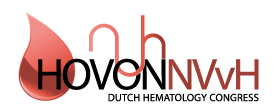Thymus hormones modulate Immune Reconstitution and Graft-versus-host Disease in Pediatric HCT.
Allogeneic hematopoietic cell transplantation (HCT) is a potentially life-saving therapy for children with malignant and non-malignant disease, but still 10-30% dies from Graft-versus-Host-Disease (GvHD). We and others previously showed the importance of adequate adaptive immune reconstitution early after HCT to lower the risk of GvHD-related mortality. The identification of factors driving early immune balance will enable strategy development to improve outcome after HCT.
The thymic hormone prothymosin-alpha (PTMA) is one of the most important factors known to maintain homeostatic immune cell function in blood and tissues. Nevertheless, endogenous plasma PTMA and its role in immune reconstitution and GvHD risk post-HCT remains understudied. We hypothesized that endogenous plasma PTMA levels would alter aGvHD risk and -related survival outcomes post-HCT. We evaluated PTMA levels in biobanked EDTA-plasma from a retrospective cohort of pediatric patients receiving their first allogeneic HCT between 2016-2024 in Utrecht.
209 Children with as median age at transplant of 8.95 Years (range 0.2-19 Years) were included in this study. After transplant, 55 (26.3%) patients developed aGvHD grade II-IV (median time: 35 days), 22 patients developed steroid-refractory (sr)-GvHD, and 25 (11.9%) developed cGvHD (median time: 193 days). Plasma samples were selected within week 1 (mean 5.2 [range 0-13] days) and week 4 (mean 25.2 [range 16-34] days) post-HCT and PTMA levels were measured. We identified high variability of plasma PTMA in the first month after HCT, with lower PTMA levels in plasma samples of patients prior to aGvHD (Figure 1). To evaluate the relation between PTMA and GvHD, we performed survival analyses on data from week 4 post-HCT using martingale residuals, resulting in “low” and “high” plasma PTMA level defined by reaching a threshold of 180 pg/mL for aGvHD grade II-IV and 100 pg/mL for cGvHD. In multivariable analysis, plasma PTMA levels over 180 pg/mL related to lower risk of aGvHD grade II-IV (HR 0.31; 0.17-0.55, p<0.001) and sr-aGvHD (HR 0.25; 0.08-0.75, p=0.014) (Figure 2A-B). PTMA levels over 100 pg/mL related to lower risk of cGvHD (HR 0.31; 0.11-0.86, p=0.024). Regarding survival outcomes, plasma PTMA levels over 180 pg/mL related to improved GvHD-Relapse-Free-Survival (GRFS) (HR 0.55; 0.35-0.86, p=0.009; Figure 2C) as well as lower overall TRM (HR 0.36; 0.16-0.82, p=0.014) and lower TRM post-aGvHD (HR 0.32; 0.13-0.83, p=0.018; Figure 2D).
These findings indicate that a low plasma PTMA level in the first month post-HCT independently relates to increased GvHD risk and -related mortality. Better understanding endogenous PTMA level dynamics can be valuable to design new strategies to increase GvHD control. Moreover, further investigation how PTMA impacts GvHD risk is needed to understand the potential and need of PTMA supplementation in patients with low endogenous PTMA levels to improve HCT-outcome.

